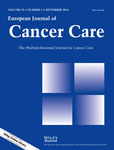The EU and cancer research
It has been a tumultuous few weeks in British and European politics—the UK's decision to leave the EU has caused widespread surprise—and, in some walks of life, outright turmoil. Concerns have been raised about the future of pan-European funding for research; much of the world's leading cancer research results from multi-centre collaboration across Europe. Universities and cancer institutes are understandably worried that lines of funding may diminish. Through this turmoil the EJCC will continue to place a high value on pan-European (and, indeed, international) collaborative research; many of our best papers involve multidisciplinary research teams from countries across Europe; it would do the international research community a great disservice should political barriers inhibit such collaboration.
Our September issue is full of interest. The topic of communication in oncology care is tackled by Abt Sacks et al. (2016)—perceptions about level and quality of communication often differ between health care providers and patients. Asking patients about their experiences of communication often leads to surprising findings, and this paper provides some novel outputs—and offers suggestions on strategies to improve communication. Christophe et al. (2016) also examined breast cancer, but from the perspective of partners. The experiences of partners are often neglected in cancer management, but partners can actively engage in management regimes and are a powerful avenue of support for patients going through stressful experiences. Furthermore, partners of cancer patients typically go through a range of emotions and challenges themselves, and these are carefully explored in Christophe et al.'s paper. Möllerberg et al. (2016) also explored the issue of partners in their Swedish registry-based study. It is important for health care providers to be attuned to the needs of partners, and to acknowledge that a diagnosis of cancer in a partner can have adverse health effects.
Observing cancer trends over time can provide important insights into factors influencing mortality and survival. In the case of colorectal cancer, surgical treatments and chemotherapy regimes have improved considerably, and this has no doubt underpinned much of the improvement in outcomes in the disease in recent decades. The effects of changes in lifestyle, such as diet and physical activity, earlier diagnosis through more effective response to symptoms and, more recently, national colorectal cancer screening programmes, are less easy to associate with disease trends. Roder et al. (2016) have used high-quality registry data to examine colorectal cancer trends in the South Australian population—an excellent example of registry-driven cancer intelligence. Quillet, Defossez, and Ingrand (2016) also use registry-based information to examine waiting times for treatment in breast cancer patients. Treatment intervals can be associated with significant anxiety, and measuring them through routinely available data (provided such data are available and accurate) is becoming a key strategy in monitoring health system performance for cancer patients.
Cancer survivors are typically provided with many forms of lifestyle advice—the concept of “survivorship” emerged almost two decades ago, and carries with it the explicit message that cancer survivors should invest in their health and adopt positive lifestyle habits. Beeken, Williams, Wardle, and Croker (2016) have undertaken a detailed qualitative study on diet in cancer survivors, and draw some interesting conclusions about the diversity of sources of dietary advice, and the quality and appropriateness of advice patients receive—well worth a read for anyone interested in cancer survivor research. Hagstrom et al. (2016) examined survivorship from the perspective of physical activity—focusing on breast cancer patients who are sedentary. The impact on fatigue in this study cohort is particularly interesting; the benefits of physical activity are legion, and appear to have a positive impact on a broad range of cancer outcomes. The mode of delivery of physical activity advice for cancer survivors is also important, as is the quality and accuracy of the information provided—Buote, Malone, Bélanger, and McGowan (2016) examine this issue in relation to web-based information.
Oral cancer is linked to tobacco and alcohol consumption; it is a condition for which we do not routinely screen in most western countries—despite the existence of identifiable pre-cancerous lesions, there is little evidence to date that screening can reduce mortality from this condition. Nevertheless, awareness of early symptoms is important, as is information on self-management strategies for oral cancer survivors, who often live with significant morbidity including facial disfigurement; Badr et al. (2016) demonstrate some interesting findings through use of a web-based strategy targeting both oral cancer patients and their family caregivers. Finally, take a look at Hamilton and Thomas's (2016) paper on the experiences of patients with lymphoedema—a condition which can be associated with significant morbidity and distress in cancer patients. Management of lymphoedema has improved significantly in recent years, and this paper presents a very positive outlook on meeting the challenges of this condition.
So, once again, plenty of interest in this issue; as always, we welcome feedback on our papers, and please look out for some themed issues on the way—in areas including primary care and global health. And let us make sure that, despite any changes in the makeup of the European Union, the pan-European, research from which we all benefit continues unabated. Cancer research is a global enterprise without borders—let us keep it that way.
Keywords
European union, registries, partners, oral cancer, communication




